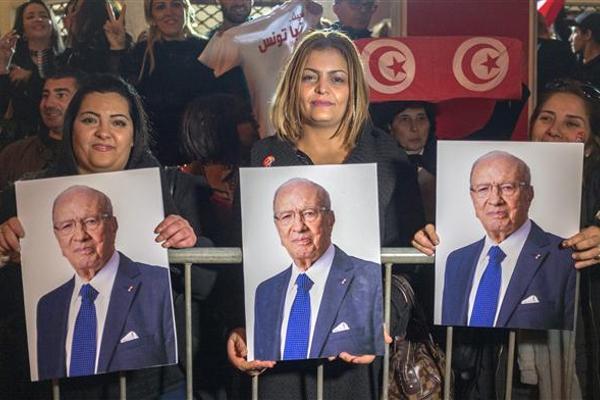Newly elected leader says Tunisia has 'turned page'
TUNIS - Agence France-Presse


Supporters of Beji Caid Essebsi hold campaign posters outside his party headquarters after he was elected Tunisian President, Monday, Dec. 22, 2014 in Tunis. AP Photo
Tunisia's new leader Beji Caid Essebsi said the country has turned the page on dictatorship after a presidential vote that European observers hailed on Tuesday as "credible and transparent".Essebsi, an 88-year-old veteran of previous Tunisian regimes, was on Monday declared the winner of a vote seen as a landmark for the birthplace of the Arab Spring.
The election rounded off Tunisia's transition to democracy and has won praise from Western leaders including US President Barack Obama.
European Union observers reported on Tuesday that Tunisians had voted "for the first time in a credible and transparent presidential election".
The head of the EU mission, Annemie Neyts-Uyttebroeck, said however that "private television channels had clearly favoured the candidate Essebsi".
That was in line with complaints from his opponent Moncef Marzouki during an often bitter and divisive campaign that has raised concerns that Essebsi's victory marks the return of Tunisia's old guard.
But Essebsi insisted Tunisia would not turn back history.
"I am for completely turning the page on the past, we must go beyond the past and look to the future," Essebsi said in a nationally televised interview late on Monday.
Marzouki, a long-exiled 69-year-old former rights activist, has conceded defeat and called for calm after hundreds of his supporters clashed with police on Sunday and Monday.
On national television late Monday, Marzouki urged supporters to respect the result and return to their homes "in the name of national unity".
"These are the rules of the democratic process," he said.
Essebsi is now expected to begin forming a government, after his Nidaa Tounes party won parliamentary polls in October.
The moderately Islamist Ennahda party, which was in power after the revolution and installed Marzouki as president, came second in the general election and has not ruled out joining in a governing coalition.
The presidential vote -- the first time Tunisians have freely elected their head of state since independence in 1956 -- was seen as a milestone for the country that sparked the Arab Spring with the 2011 ouster of longtime strongman Zine El Abidine Ben Ali.
The revolution that began in Tunisia spread to many parts of the Arab world, with mass protests in Egypt, Libya, Syria and Yemen.
In every country except Tunisia the revolution was followed by violent turmoil or, as in Syria's case, a devastating civil war.
Obama congratulated Essebsi and hailed the vote as "a vital step toward the completion of Tunisia's momentous transition to democracy".
President Francois Hollande of France, Tunisia's former colonial ruler, also praised Tunisians for their "determination, sense of responsibility and spirit of compromise".
The next government will face major challenges.
Tunisia's economy is struggling to recover from the upheaval of the revolution and there are fears widespread joblessness will cause social unrest.
A nascent jihadist threat has also emerged, with militant groups long suppressed under Ben Ali carrying out attacks including the killings of two anti-Islamist politicians.
Ahead of the vote, jihadists issued a videotaped threat against Tunisia's political establishment.
Tunisian newspapers on Tuesday underlined the difficulties ahead, with daily La Presse saying the new leader must deal with "a massive debt, weak growth, high unemployment, deteriorating competitiveness and highly threatened security".
Le Temps hailed Tunisia for emerging "victorious from a gruelling and painful ordeal," adding that voters had not given Essebsi a "blank cheque" to do as he pleases.
"No party is in a position to claim that it alone can solve the country's problems," the daily said.
